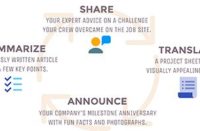Most polished concrete companies are small and just starting out. Like in any industry, they compete with more established companies and larger, more established industries.
If you are just starting out as a small company, you are well aware of your hurdles. You know that larger companies have more resources. But you should also be aware of your advantages. They far outweigh your disadvantages.
Small companies can, for very little money, look organized and professional. But beyond this, you have the freedom of movement to quickly adapt and change with the business environment and the personal contact that is so vital in building relationships. If you hone your leadership skills, the business is theirs to lose and yours to gain.
Entrepreneurship, leadership and relationships are the three greatest advantages of the smaller company. Larger companies discourage entrepreneurial thinking. They like things down to a science, and don’t usually appreciate someone who thinks differently. The small company, in closer contact with the customer, can more quickly identify changes in the marketplace and much more quickly adapt to the changing marketplace. The new entrepreneur is more likely to try new ideas and forge new business frontiers. The new entrepreneur is also more likely to convey a vision. In larger companies, ownership and management are further away from the customer. The company vision can easily lose its emotional appeal on its journey through the chain of command. The company can easily become out of touch with the customer.
Everyone knows that relationships are important in sales, but not everyone understands how closely relationship building and leadership are connected, and most don’t understand the subtle difference that makes some people extremely successful in leadership and relationship building while others succeed only moderately. The difference is emotional intelligence. People who are good at building strong relationships have charisma, which is nothing more than emotional intelligence.
A leader with a vision and a visionary leader are not the same. It is not enough to simply have a vision and convey the vision to a group of people. You must be emotionally intelligent to understand how to emotionally convey a vision. Without creating an emotional connection, your message won’t be felt or even fully heard. Emotion is vital in creating a connection with the customer and your employees. Whoever first said, “It’s not personal, it’s only business,” didn’t have a clue. Business that is conducted impersonally is business that is vulnerable. You have to remember that you are more than a businessman. You are a leader.
Visionary leadership requires sincerity. It requires honesty. It requires a humble leader that is not above any task and not above any customer. It is important to be on the same wavelength as your customer. It is important to understand your customer’s point of view. You cannot simply dictate. You must listen.
It is also very important to communicate with all your employees on a regular basis. They are usually best connected with reality. It is important to understand the current reality in order to change it to a new reality.
Visionary leadership requires the ability to use emotional intelligence to capture an audience and affect their attitudes and cultures. It requires reading emotions, capturing emotions, and, finally, directing emotions.
Barack Obama has great emotional intelligence, and he harnesses it effectively. Ronald Reagan had emotional intelligence. Sam Walton had emotional intelligence. It is common in entrepreneurs, rarer in larger companies, and virtually extinct in publicly held or investment group-owned companies.
If you are a small guy just starting out, hold onto your dream and your vision, and work on your skills as a visionary leader. Convey your sincerity, confidence, and excitement to others — and include them in it. Make them feel as though the outcome of your vision depends a great deal upon them. Remember that survival of the fittest doesn’t mean survival of the biggest. Dinosaurs continue to die out every day, and new opportunities arise for the smaller, more agile, more adaptable and more charismatic.















